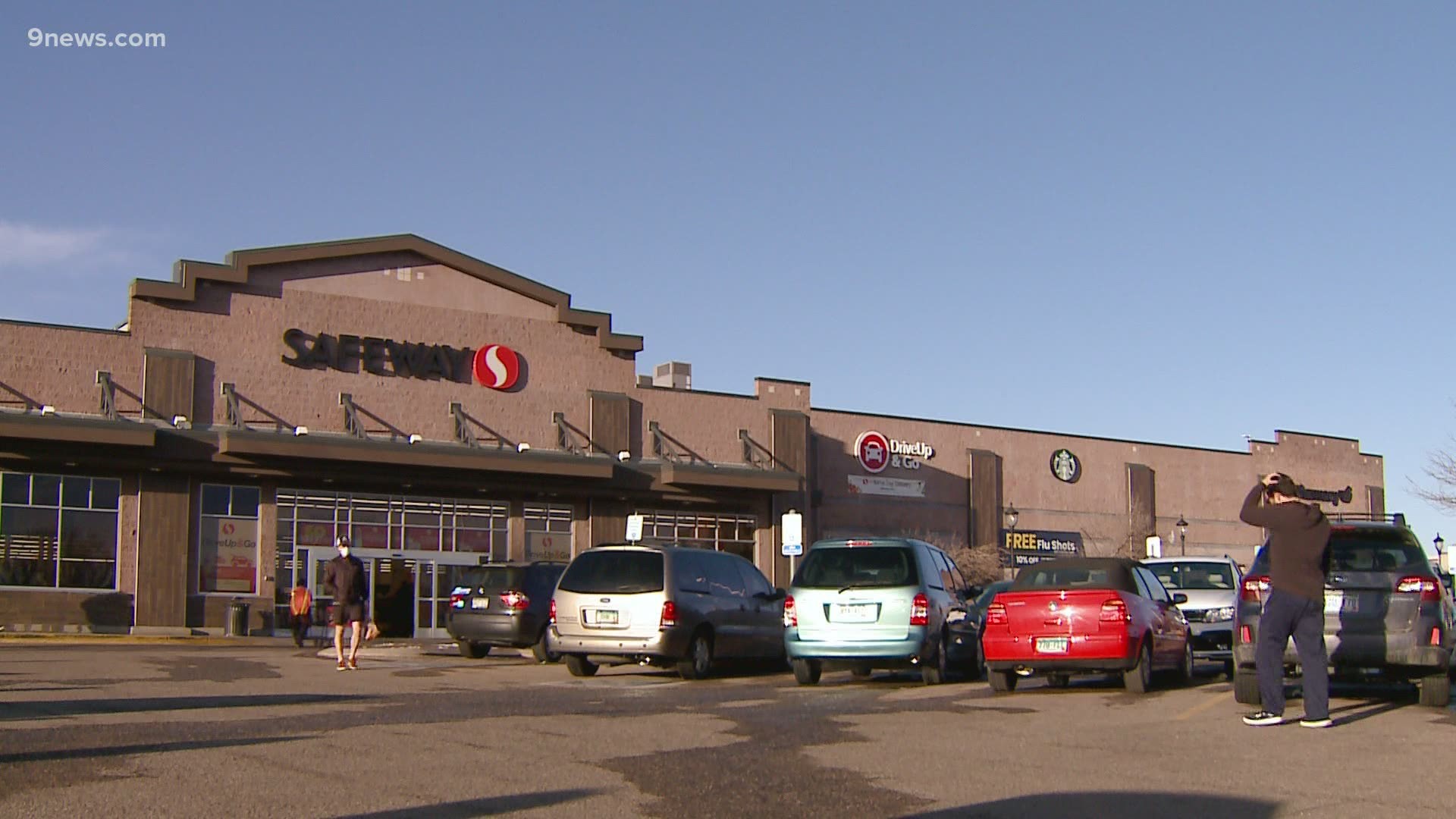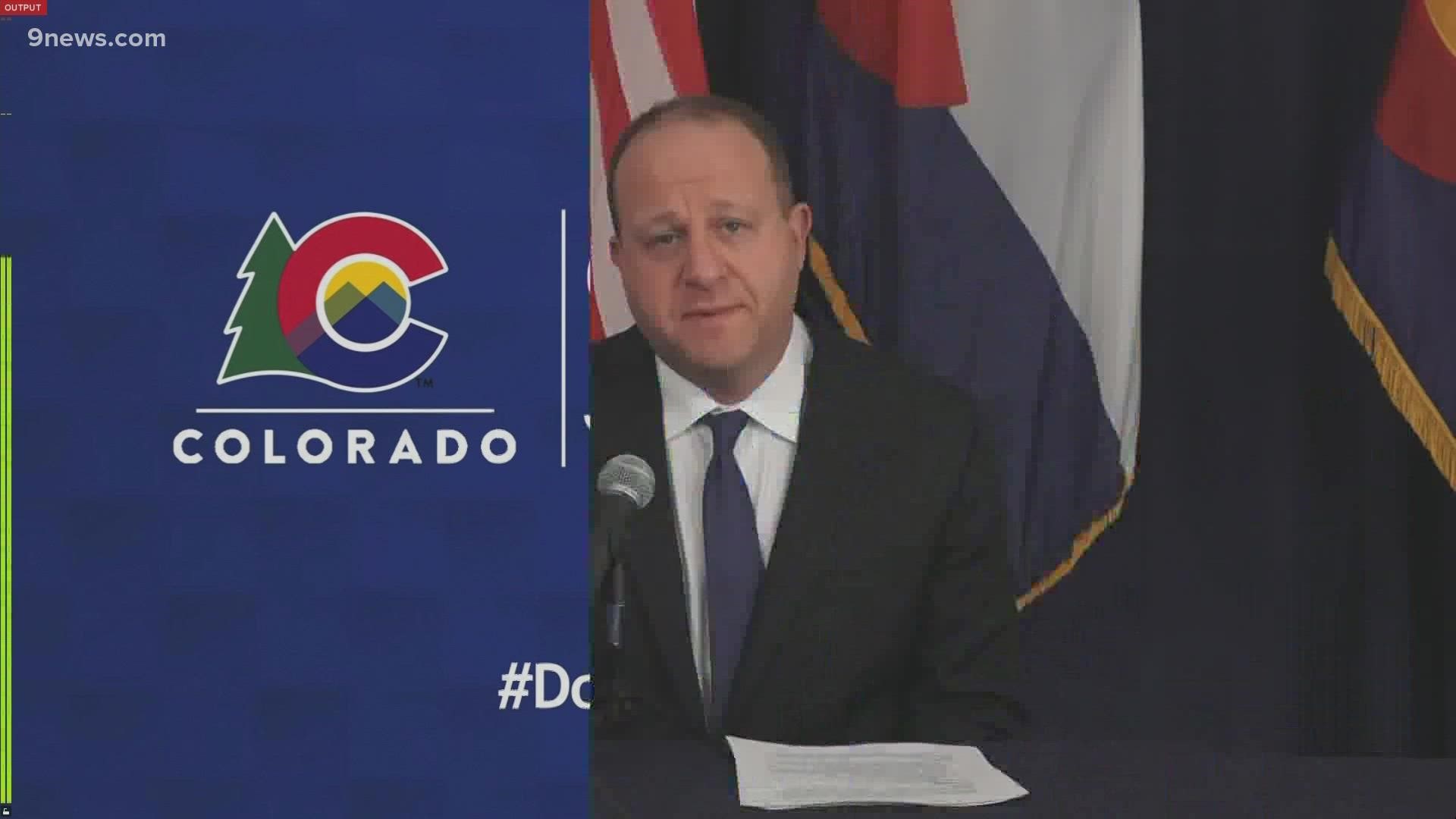DENVER — Gov. Jared Polis announced that those 60+ will be eligible for the COVID-19 vaccine on Friday, March 5 along with some frontline essential workers, such as grocery store employees, as the state nears its goal of vaccinating 70% of those 70 and older.
Polis was joined at a Friday, Feb. 26 briefing at the Governor's Residence by Brig. Gen. Scott Sherman and Scott Bookman, COVID-19 incident commander for the Colorado Department of Public Health and Environment.
At the briefing, they announced changes to the phases of distribution, including new information about Phase IB.3 and 1B.4.
Phase 1B.3 - March 5
This group includes about 958,000 people who will become eligible to receive the vaccine on March 5.
- People age 60 and older.
- Frontline essential workers in grocery and agriculture, including meatpacking workers, grocery store workers and agricultural processing workers.
- People age 16-59 with two or more of the following:
- Cancer (defined as patients who are currently receiving treatment or have received treatment within the last month for cancer)
- Chronic kidney disease
- COPD
- Diabetes mellitus (types 1 and 2)
- Down syndrome
- Specific heart conditions (heart failure, cardiomyopathies or coronary heart disease, and severe valvular/congenital heart disease)
- Obesity (BMI of 30 or more)
- Pregnancy
- Sickle cell disease
- Solid organ transplant
- Individuals with disabilities who require direct care in their home
- People with disabilities that prevent them from wearing masks.
Polis said they're working with agriculture companies such as JBS and Cargill to provide vaccines at their workplaces.
Grocery workers should work with the pharmacy within their store if their store can schedule their vaccine.
People in the 60+ age group should go through their healthcare provider or a health system and said they'll provide an update next week with more information about the best way for this age group to sign up.
Those with health conditions will be required to fill out a form regarding their health.
>> Watch the full Friday conference below
Phase 1B.4 - Around March 21
This group is much larger and includes an estimated 2.5 million Coloradans, including those 50 and older, who could become eligible to receive the vaccine as early as March 21, officials said Friday. It also includes frontline essential workers in the following fields:
- Higher education, student-facing staff including instructors, professors, vocational educators and staff providing safety and other support services offered inside the school.
- Food/restaurant services
- Manufacturing
- US postal service
- Public transit and specialized transportation
- Workers in public health:
- Human service workers This includes but is not limited to social workers, community health workers, those who work in client homes, in community locations, and at human services work locations, and others who provide direct or in-person services to elderly and disabled populations, at domestic violence advocacy organizations or in-person resource providers.
- Faith leaders: This includes current faith leaders who must enter hospitals or other care facilities to perform last rites, who officiate life rites such as weddings and baptisms and who lead worship services.
- Frontline essential direct care providers for Coloradans experiencing homelessness
- Frontline essential journalists
- Continuity of local government; includes select executives of those governments and a limited amount of essential support staff needed to provide for continuity of government, including members of the judicial branch who regularly come into contact with the public (e.g. state and county court trial judges, court administrators, public defenders and probation staff.)
- Continuation of operations for state government, including select staff needed to deliver essential services to the people of Colorado as identified in the agencies’ continuity of operations plans.
This phase also includes adults who received a placebo and people ages 16-49 with one of the following higher risk conditions:
- Any condition listed in 1B.3
- Asthma (moderate-to-severe)
- Cerebrovascular disease (affects blood vessels and blood supply to the brain)
- Cystic fibrosis
- Hypertension or high blood pressure
- Immunocompromised state (weakened immune system) from blood or bone marrow transplant
- Immune deficiencies
- HIV
- Use of corticosteroids, or use of other immune weakening medicines
- Neurologic conditions, such as dementia, liver disease, pulmonary fibrosis (having damaged or scarred lung tissues), thalassemia (a type of blood disorder).
Community vaccination sites
The state expects the federal government to announce a large increase in the supply of vaccine doses to states next week.
The\ose extra doses are expected to arrive in Colorado toward the end of March or early April.
"In order to prepare for that demand, we've worked with our hospitals are pharmacies, our major healthcare providers to help really set up community vaccination sites," said Brig. Gen. Scott Sherman.
They're focused on six sites:
- Denver- Ball Arena
- Adams County - Dick's Sporting Goods Park
- Mesa County- Grand Junction Convention Center
- El Paso County- Broadmoor World Arena
- Larimer County- The Ranch Events Complex
- Pueblo- Pueblo Mall
"Our goal is once allocation increases, we want to get these to Tier 1 sites," Sherman said. "So that's 5 to 6,000 shots per day. And we certainly think into April we will see that allocation increase so we can get to that level."
Polis has said repeatedly that he hoped that 70% of Coloradans 70 and older would receive the first dose of the COVID-19 vaccine by the end of February. People in that age group were included in Phase 1B.1 along with health-care workers and first-responders.
Phase 1B.2 started Feb. 8 and included educators, child-care workers and Coloradans age 65-69. Polis said in January that the goal was to vaccinate 55% of that group by March 5 and, once that happened, the state would move to the next vaccination group.
RELATED: Vaccine guide: What to know about getting the COVID-19 vaccine in Colorado, and what happens next
Polis has said he was counting on U.S. Food and Drug Administration (FDA) approval for a Johnson & Johnson one-dose vaccine. CDPHE officials said this week they expect the FDA will give Emergency Use Authorization to the vaccine on Saturday.
Once that authorization is place, Colorado could receive shipments of what would be the third approved vaccine early next week, increasing the state's overall supply, CDPHE officials said on Thursday.
The federal government communicated that Colorado should expect about 45,000 doses of the Johnson & Johnson vaccine next week, but CDPHE said it was waiting to finalize the beginning of Phase 1B.3 until there was more concrete data.
Phase 1B.3 will include frontline essential workers and Coloradans with two or more high-risk conditions. One company that falls into that category, the JBS Greeley meatpacking plant, announced this week that it will hold a vaccine clinic on March 6 and 7.
One employer's plan
As Phase 1B.3 begins in early March, Governor Polis said the first essential workers to receive vaccines will likely get them through their employers. That includes agriculture workers and grocery store workers.
"The few areas we're focused on around March 5, its administered largely on-site or special clinics," Polis said Friday. "So, we go to JBS and Cargill. It's on-site, for employees. Most grocery workers able to be done through pharmacies."
And the grocery company Safeway says it's ready to start vaccinating its employees on-site once 1B.3 begins on March 5.
Safeway has been administering vaccines to previously eligible groups for weeks already.
"Been doing that since first of year, right after Christmas holidays," said Nikki Price, the director of pharmacy operations for Safeway.
"It's going to be, overall, a really simple process. We know who our associates are, when they want a vaccine, and we’ll schedule them through an appointment basis just like we do for our current phases. Communication will be very clear to them and to our pharmacy team."
Price said Safeway plans to stagger the schedule for staff vaccinations since some people experience more significant symptoms after receiving the second dose.
It's been a tough year for grocery store workers. Price said Safeway employees are eager to get their shots, and pharmacists are eager to give them.
"We have associates of all ages, all demographics, several have medical conditions," she said. "They put their lives at risk every time they go to the store so you can get your gallon of milk, produce for the week, groceries for week. They’re in day in and day out to take care of customers."
"To know that we're going to be able to protect our associates and really protect their families, with them going home, and then they’re vaccinated. That’s really rewarding to me and really rewarding to our company."
For agriculture workers or grocery workers without a pharmacy or vaccine event on site, or for those with multiple high-risk health conditions, the state is directing them to hospitals and other health care providers to make a vaccine appointment.
The state plans to share more information about sign ups next week.
COVID variants in Colorado
CDPHE officials have said research suggested that variants could become the dominant strains in the U.S. by April, which could lead to a spring surge in cases. That evidence, which included low transmission rates of variants in Colorado, did not suggest that was happening at this time, officials said.
So far, two variants have been identified in Colorado: the B117 strain first discovered in the United Kingdom, and the L452R variant discovered in California, officials said.
Overall, 1 in every 194 Coloradans are currently positive for COVID-19, and only a very small portion of that population are infected with a variant, CDPHE said on Friday.
SUGGESTED VIDEOS: COVID-19 Vaccine


